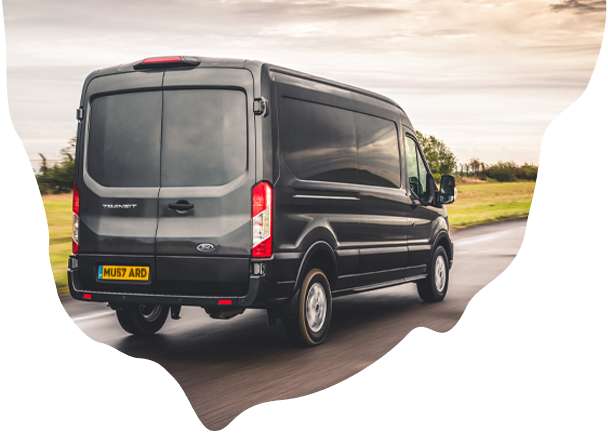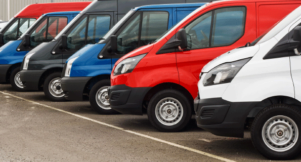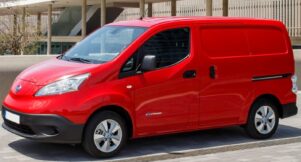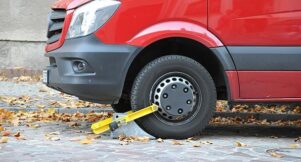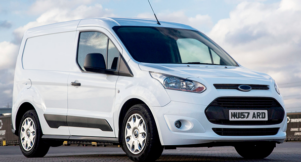Some of the insurance companies we work with



A van insurance policy is generally more expensive than a car insurance policy because vans typically cover more miles and often come with larger engines. Finding cheap van insurance is possible – but you need to search smart. At mustard.co.uk we help you search for quotes from over 50 leading insurers.
Van insurance types
Vans come with different insurance rules to cars. And it is important to select the correct class of use for your policy when purchasing a van insurance policy. First, you will need to decide whether you will need business or private insurance. Then, it’s the type of cover you will require for your van. Insurance is a legal requirement, but the basic cover may not be the best fit for your needs. A policy can be used to protect your livelihood or the goods you’re transporting.

Business Van Insurance Also known as commercial van insurance. This type of cover is essential for anyone who uses their van for work, including travel to or from more than one business location. It will cover you and your van when using it for work-related purposes, including commuting. You will then need to select the classification that best covers your needs: – Carriage of own goods: if you need to transport your own tools and materials between jobs, then you will need carriage of own goods business insurance. – Carriage of goods for hire or reward: this cover insures you to use your van to make deliveries ie. courier insurance.
When searching for a van insurance policy, you want to find the insurance policy that best suits your budget. By comparing insurance quotes across the market, you could save hundreds of pounds. At mustard.co.uk, we search prices from the UK’s top insurance providers and brokers to help you find the insurance policy you need. You can easily compare quotes using our simple online form – we do the rest! To help you try to save even more money on your policy, we have put together our 5 top tips for saving money on your van insurance quote:
Increase your van’s security: by fitting an approved security device to your van, like an immobiliser or tracking device, you could see a decrease in your premium.
Try and avoid modifications: most insurers will view modifications to your van as an increased risk, which increases your premium price. If you can avoid modifications to your van, you could see a lower premium price! This does not apply to advertising or wraps on your van if you use your van for business.
Consider signwriting and wraps: some insurers consider signwriting to be a positive feature that makes your van easy to identify and therefore a deterrent to thieves. Check with the individual insurer, but it could lower your premium.
Limit your mileage: the more miles you drive, the more you will have to pay. If you can, lower the number of miles you drive to help reduce the cost of your van insurance.
What level of van insurance cover should I choose?
Whether you drive a van, a pick-up truck, a minibus, or an ice cream van, there are three levels of van insurance that you can choose from. And it is a legal requirement to have van insurance if you are driving a van on UK roads. You will need to have either third-party only insurance, third party, fire and theft insurance, or comprehensive van insurance. Here’s a useful breakdown of the levels of van insurance you can purchase:

Comprehensive
This is the top level of cover that you can purchase for your van, it includes third party, fire and theft and third-party only cover. It covers you if you cause damage to another person’s vehicle, as well as any damage to your own van. You can also claim on your comprehensive insurance for accidents where fault cannot be proven. No matter what insurance policy you choose, make sure you get the best of what’s on offer and compare van insurance right here.

Third Party Only
Also known as TPO, this is the minimum level of cover that you’ll need for your van to legally drive it on UK roads. It covers you whilst driving for any damage or injury to other people and their vehicles. But if you have an accident, and you are at fault, it won’t cover any damage to your own vehicle or any of your injuries. However, don’t assume that this level of cover will be the cheapest just because it is the most basic.

Third Party Fire And Theft
Also known as TPFT, this is the middle level of cover between comprehensive and third-party only cover. It covers you if you cause damage to another person’s vehicle. But it doesn’t cover the damage to your vehicle. You are covered for the cost of repairs, or a replacement vehicle, if your van is damaged in a fire or is stolen.
Why compare van insurance quotes with mustard?
By comparing quotes with a comparison site, like mustard.co.uk, you could save hundreds on your van insurance policy. When you compare your van insurance quote with us, you can see a range of policy types from over 50 leading providers to find the deal that suits you and your van!
To start comparing, simply complete our online quote form (it takes less than 5 minutes) and we do the rest! Start your quote here.

Call us on 0330 022 5970 for a quote over the phone
How much does my van insurance cost?
The cost of your van insurance will vary depending on several factors. When searching for van insurance, insurers will consider many things including your annual mileage, the make, and model of your van, your driving history as well as your personal circumstances.
What extras can you get with van insurance?
When searching around for the perfect van insurance policy, you will come across optional extras that most insurers will offer. These are the most common ones you can add to your policy to help suit you and your van’s needs:
- Breakdown cover: if your van breaks down, having breakdown cover can help you get back on the road quickly. Most insurers will offer breakdown cover as an optional extra with your van insurance.
- Legal protection: if you are ever involved in a road accident, some of the legal costs will be covered by this extra for your insurance.
- Tool and equipment cover: if you are transporting tools and equipment in your van, you will want them to be covered if anything happens to them. This extra is not offered by many insurers but is good to have if you keep your tools in your van.
What details do I need to get a quote?
Comparing van insurance quotes is a quick and easy process – it takes less than 5 minutes! Although you will need to answer a few questions, we’ll search for prices from over 50 leading insurers to bring you a range of policies.
Here are the details you will need to get your van quotes:
- Your details: your age, your job, where you live, and where your van is kept overnight. You may also be asked for your driving license number – so make sure you have this to hand.
- Van details: including the reg plate, the make, model, and estimated value of your van. As well as any modifications that have been made.
- Usage of your Van: the intended yearly mileage and how you plan to use your van (commercially or personal use).
Van insurance advice and FAQs
Can you insure a van in your company name?
You can insure a van in your company’s name if your business entity owns the vehicle – in other words, if the van has not been registered to you personally. If the van is registered to you, sole trader insurance will be more appropriate as this insures you to use your own van for business purposes.
How does insurance group affect van insurance?
A van’s insurance group is an important classification for insurance quotes – the lower the group, the cheaper insurance will be. Insurance groups are calculated similarly for vans and cars, but weight is an added factor since heavier vans are harder to control. Learn about your van’s insurance group with our handy guide.
How is a campervan classed for insurance purposes?
Purpose-built campervans sit in their own insurance category, as do larger motorhomes – so they should not be insured as vans. Modified vans are sometimes still classed as vans, though, so DIY campervan conversions may require van insurance.
Find out more about campervan insurance here.
Can I drive a van on my car insurance?
Some fully comprehensive policies will provide you third-party level cover for driving a van for personal use, as long as you have permission from the owner, however each policy is different, and this is no longer included as standard. You will need to check with your insurance provider before driving any other vehicle.
Can you tell me who I’m insured with?
If you’ve had a sudden moment of panic and can’t remember if you’re insured, or even who you’re insured with, then don’t worry, there are things you can do.
- Check the Motor Insurance Database (MID) – this is the quickest way of finding out whether your car is insured or not. Simply type in your number plate and the system will immediately show you whether or not your car is covered.
- Check your emails and bank account – if you are insured but you can’t remember who with, then go through your emails to see if you can find any correspondence or confirmation. If an email search is unsuccessful, your old bank statements should reveal any regular or one-off payments to your insurance provider.
- Retrieve your quote – if you used a comparison website, like mustard.co.uk, you should be able to retrieve your quotes. While you might not be able to see which policy you bought, it could jog your memory.
For more help visit our webpage to see more tips on finding out if your car or van is insured.
mustard.co.uk Car Insurance Reviews
Take a look at our genuine customer reviews

